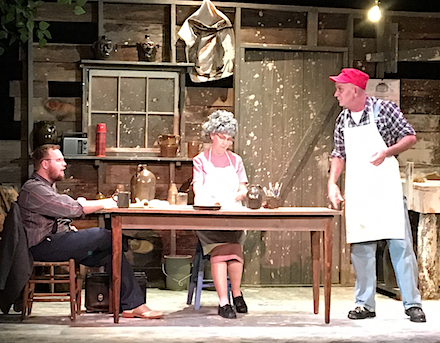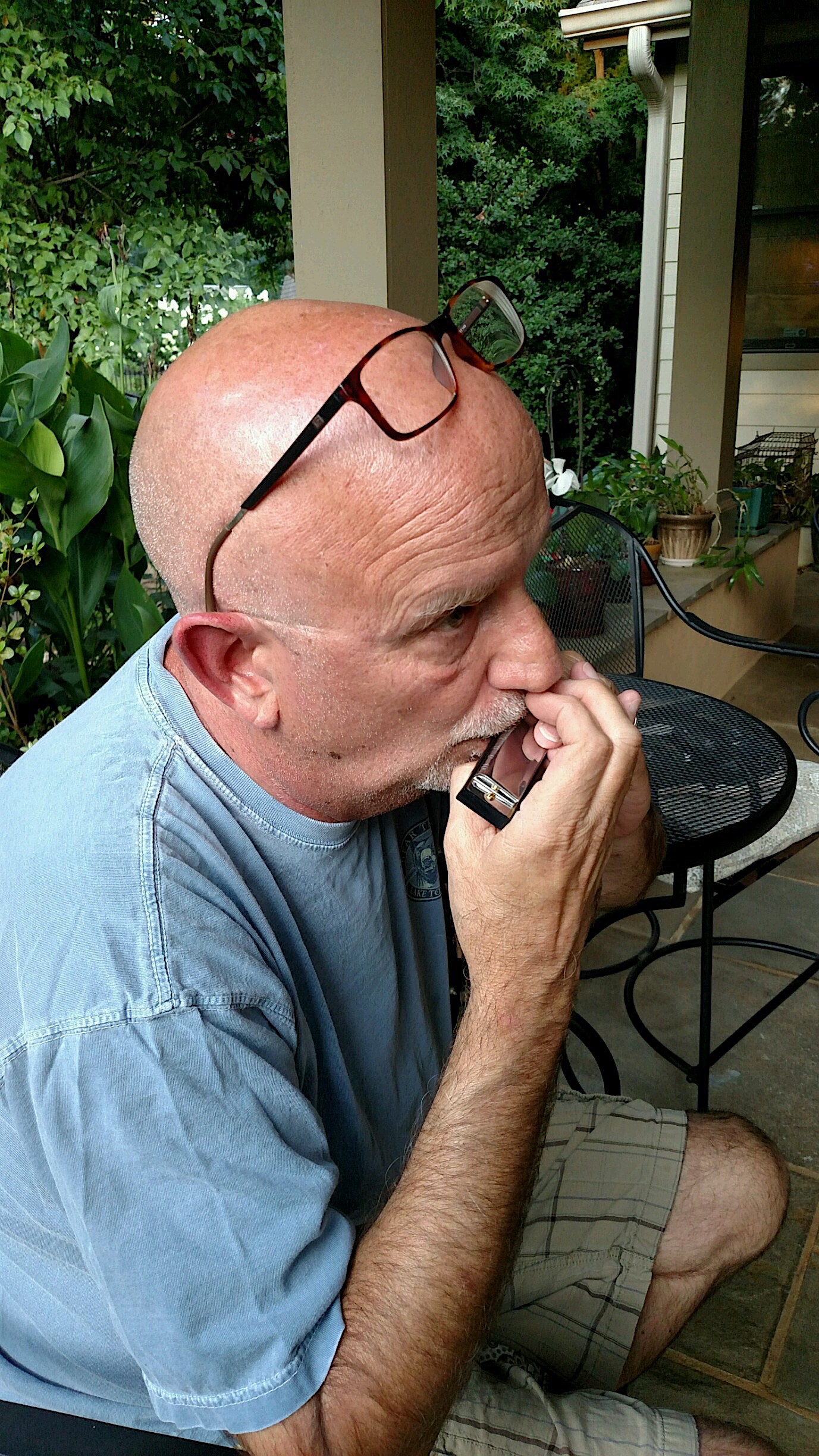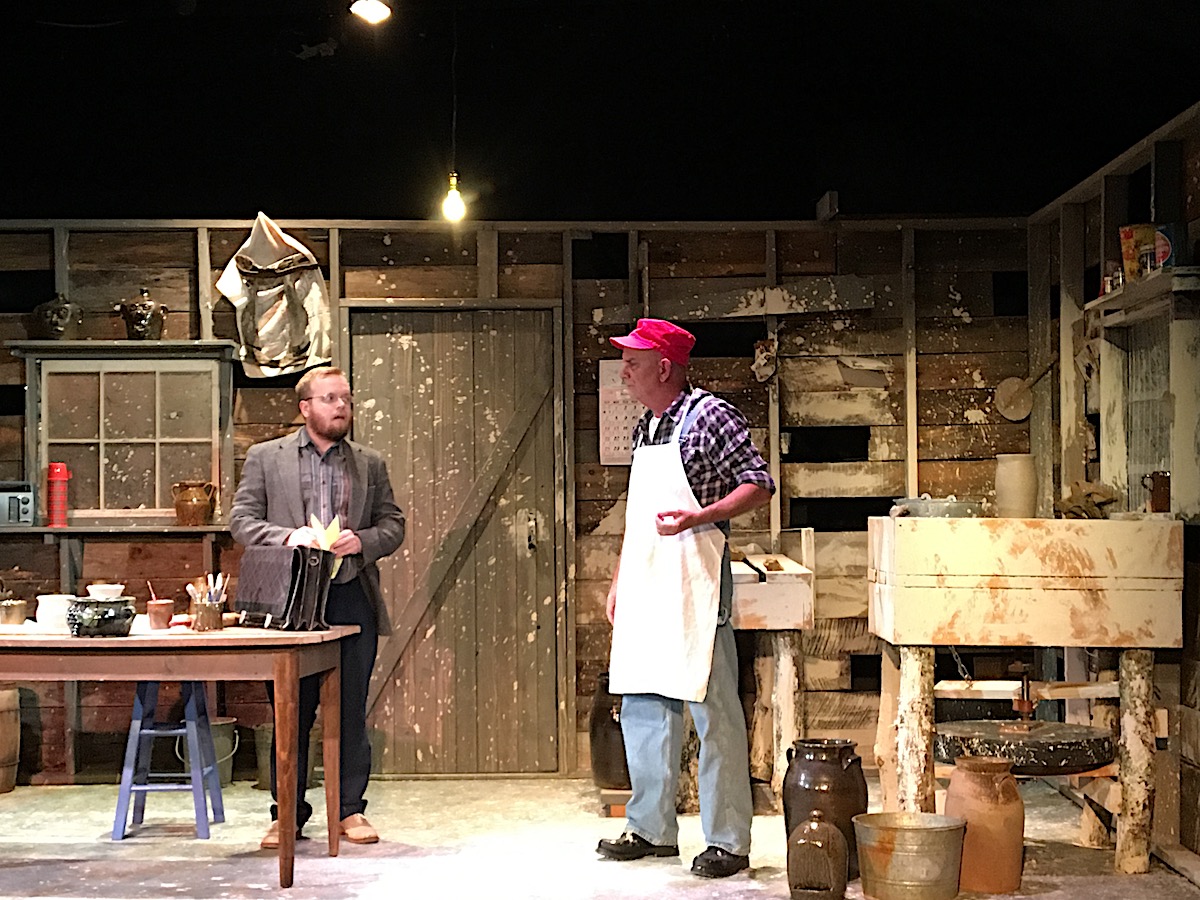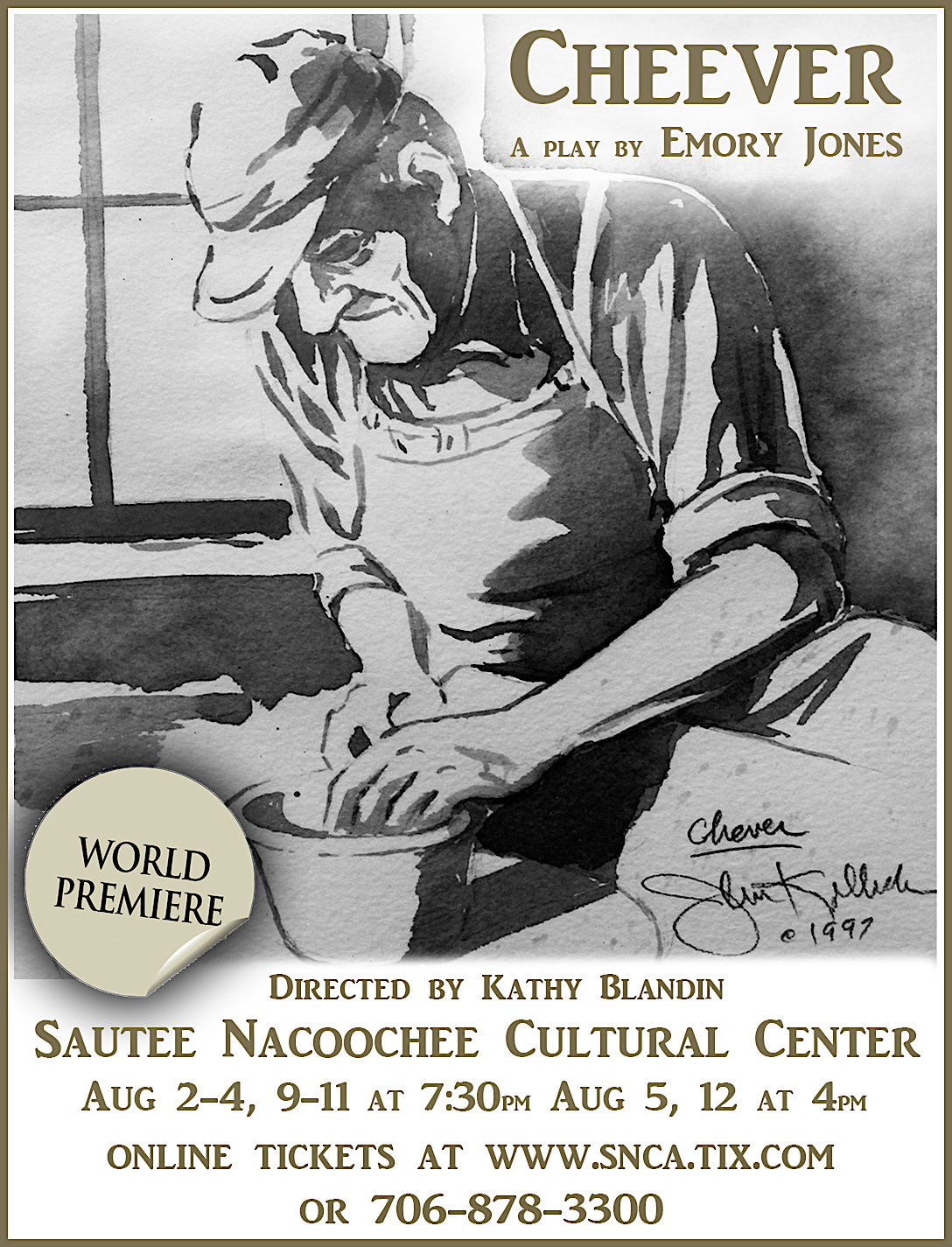
William (Bill) Gabelhausen has aged several decades since the last time I saw him a few months ago. He’s in blue jeans and an apron which are covered in clay. He’s been playing in the mud, pretending to make pots in the role of Cheever Meaders. It’s the first time he’s been on stage in several years and he intends to be the best Cheever he can be.
Although Emory Jones has written many lines for Bill to learn, the character is more than words. Cheever’s mannerisms, speech patterns, and skill sets all had to be mastered in just a few short weeks.
I first met Bill when I was working at Piedmont College in Demorest. In addition to my responsibilities in the music department as an accompanist, I occasionally stepped in to be musical director in musical theater performances. Our production was Working, a musical by Stephen Schwartz and Nina Faso, based on the book by Studs Terkel. We had an amazing cast, and when Bill needed some little kids for the show, he pulled my three children into the production. I was proud to be a part of the show and thrilled to have a new friend. He was hard-working and fair and treated the kids with respect. This was the beginning of his tenure at Piedmont.
I sat down with him before a recent dress rehearsal of the world premiere of Cheever to discuss his life in theater and the challenges of this particular role.
Where did theater start for you?
I grew up in Peoria, Illinois, kind of central Illinois, just south of Chicago. I grew up playing football, but then I hit my growth spurt my junior year of high school and couldn’t play anymore. Someone suggested I try out for a play. I thought I wouldn’t be good at that. But I did it, fell in love with theater, and have been doing it ever since.
Did you know that you would do theater when you went to college?
I did. Everyone in my family had worked for Caterpillar Tractor Company and I broke the mold. I started looking at performing arts colleges in St. Louis and Illinois.
Did you go directly into your master’s degree?
No, I worked professionally for a couple of years. I spent some time in New York and ended up luckily getting tours. Then I went back for my master’s and worked again professionally for a time. The last tour I did kind of ended in the south and I’d let my sublet go in New York, so I decided I’d just see what happens in Atlanta. And I haven’t left since!
You went to UGA? (University of Georgia in Athens)
I did. My first masters is a MFA (Master of Fine Arts) from Penn State. After that I did a national tour with The Elephant Man and The Taming of the Shrew. With Shrew, there was an educational component to it. We did workshops with high school students and I fell in love with teaching. So I went back for another master’s degree at UGA in secondary English education.
Did you teach in public school?
I taught for twelve years in the Clarke/Oconee/Watkinsville/Athens area. My first year was part-time English – part-time theater, and by my second year, I was full-time. There had been a theater program there before, but it was mostly an afterschool thing. It was nice; they trusted me to build a theater program and it has blossomed ever since, which is a great thing.

Did you leave teaching to come to Piedmont?
Yes, this will be year twelve. Crimes of the Heart was my first production. It was the last year of Jenkins Auditorium [before moving into the new building].
What was your favorite role?
I started out as a dancer who could act, but singing wasn’t my strong suit. So my professional work led me to more acting roles. My most rewarding role was Frederick Treves in The Elephant Man. It’s such a rich role, based on real human being, a man who had a huge heart, but was also tied to science. He was an amazing man to be able to bring to the stage. We toured for nine months.
What is like to tour for nine months?
I’m glad I did it when I was younger. You get to see so many amazing things – we saw 38 of the 50 states on that one tour. You see so many things, but it’s such a nomadic life. You live out of a suitcase. If you are in a city for more than four days, it’s like a vacation. It was amazing, but I couldn’t do it now. Even if the opportunity arose, I’m too much of a homebody now. I’m glad I did the tours, the New York, the Chicago, the east coast thing because I knew I would eventually want to set down roots and now I have [settled down.]
Where do you live now?
My main residence is in Watkinsville, but I have a tiny house in Demorest so I don’t have to go back and forth during the week.
Did Rick Rose (former chair of the theater department) bring you to Piedmont?
I had heard of Rick, but I don’t know if we had ever formally met. I heard from a colleague of mine at Oconee that he [Rick] was looking for someone to come up and help write a drama education degree. So I talked to him and I went and it was scary. I had taught high school for twelve years and loved teaching high school and probably could have retired as a public school teacher. It was hard to leave the kids. It wasn’t hard to leave bus duty and writing detentions and all that. But after the first three or four months, I thought this was my new home.
How much longer was Rick there?
He was there three more years. He provided a beautiful transition into Swanson [the new theater building], from one space to another. Then he asked me with administration’s approval if I would consider being department chair. I had never held an administrative position before. In public school, others had encouraged me to become an assistant principal, but I just loved teaching way too much. There was a huge learning curve when I became department chair. I found myself really battling the love of teaching versus paperwork. I still battle it. It has gotten much easier because I have learned to prioritize – and teaching always takes priority one. I have gotten better, I think – knock on wood. Every year presents a new challenge.

What is your first love? Is it being on stage? Is it directing, or teaching?
My first love is teaching and it has been for a while. Then it would be directing. This role in Cheever as Cheever marks my “coming out of retirement.” I haven’t been on stage in over eight years, and even then it was a very small role in a student written production. So it’s been a great experience, but, wow, it’s been a challenge. A good challenge. This show has challenged me in ways I hope I challenge my students on a daily basis.
What do you mean?
Really trying to throw yourself into a role. To live in the skin of someone who isn’t like you. To find those bridges between them [the character] and your sense of self. Fighting for an understanding. Cheever is a huge storyteller, and it’s one thing to tell a story, but what makes it compelling is to find the reason for the story. I preach that to my students a lot. Now I have to practice what I preach.
What have been your specific challenges to this role?
Even when I worked professionally because of my look, I was never an ingénue [a typecast, lead character]. I was always a character actor. It’s been a long time since I’ve carried a show in that all the action revolves around me. I’m intimidated by that at times. Thankfully, I’m on stage with actors who not only support me, but I support them. There’s a real sense of talking and listening to each other which helps in creating that reality.
And you are working with Emory [Jones, the author]?
Yes. We worked together last summer in The Valley Where They Danced [at North Georgia Theater]. I was the director and this summer, I’m an actor. It’s great. It’s so rare to work with the actual playwright. He’s just such a wealth of information. Especially since Emory is related by bloodline to Cheever and remembers him when he [Emory] was a younger boy. I ask a lot of questions about how he [Cheever] moved, what were his physical limitations with his arm, and the fact that I’m playing Cheever at the age of 80. Emory would demonstrate and I would watch a lot. I have made it my own, but I’m trying to pay homage to Cheever.
 Is it nerve-wracking to think about those in the audience who knew Cheever?
Is it nerve-wracking to think about those in the audience who knew Cheever?
Absolutely! But Kathy [Blandin], the director, has been wonderful. We truly are trying to give a slice of life. There are no scene changes and everything happens in real time. It’s a theatrical representation. So this is our spin on it while still trying to remain loyal. Our first read through, Cheever’s daughter was present and corrected her nickname pronunciation. She was absolutely wonderful, but that’s when it first set in. Wow! I’m going to be presenting this in front of people who knew and loved this man. It’s a wonderful challenge.
You had to learn how to throw mud?
Yes! Thank you, Jeanie Daves! She was so patient with me! I don’t have to actually throw mud in the show, but I have to look like I know what I’m doing! But I loved it. That and playing the harmonica; it’s been one challenge after another, but really a rewarding challenge. I’m glad I’ve had quite a while to sit with the show.
“Cheever” is now appearing at the Sautee Nacoochee Cultural Center in Sautee, GA. Upcoming performances are August 4, 9, 10, and 11 at 7:30 p.m. and August 5 and 12 at 4 p.m. For ticket information visit www.snca.tix.com or call 706-878-3300.
Look for more artist profiles each month. If you have suggestions for events or interviews send them to [email protected]






